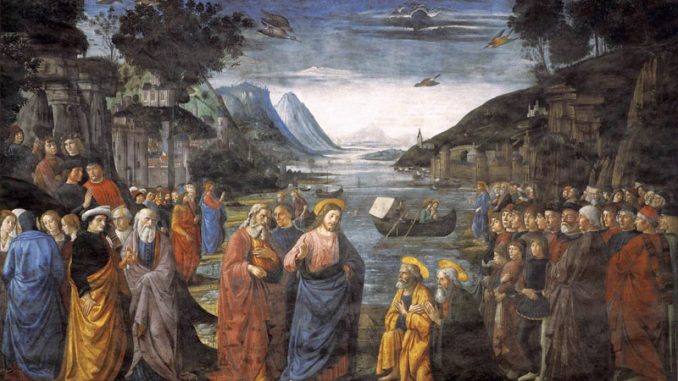
To say that recent months have been stressful and strange would surprise no one.
For those of us in ministerial roles, the unthinkable has happened: We’ve been called to provide service with minimal physical presence of people. For all of us, watching the news prompts exalted angst. Unconscionable targetings and killings have been followed by senseless riots and looting. Tropical storms started early, and on June 20 a Siberian town reached the unprecedented temperature of 100.4˚ F. Beaches and restaurants and workplaces reopened — presumably with social distancing and masks — and cases of COVID-19 in South Carolina have soared.
General absolution and livestreamed Masses have cut back or disappeared as churches slowly resume live celebrations of sacraments, but holy water fonts are empty, pews are taped or roped off, we receive Holy Communion through holes in plastic stands, and choirs can’t gather because of the droplets that singers might send into the air.
I’m accustomed to face-to-face gatherings. What has substituted for them have been webinars and Zoom meetings with our diocese’s deacon aspirant class, the Interfaith Partners of South Carolina, and the national Buddhist-Catholic dialogue; international presentations with chat coordinated by Greenfaith, the Jewish Anti-Defamation League and the Rumi Forum; emails regarding plans with the South Carolina Christian Action Council; and frequent online meetings with a subcommittee working on a project for the U.S. Conference of Catholic Bishops.
The one live ecumenical event I’ve attended was a gathering of 12 at a park in Ridgeland to honor the memory of Rev. Clementa Pinckney and those killed at Mother Emanuel five years ago and to pray together for the healing of our nation.
A recurrent theme of these calls, online meetings, and worship activities has been the fear besetting people. And I found myself wondering why, throughout this time, I haven’t felt afraid.
One reason perhaps is that after surviving blizzards, hurricane evacuations, two serious auto accidents, and several life-threatening diabetic calamities, I tend to feel that I’m on bonus time and that life itself, moment by moment, is a cause for gratitude.
Another reason, however, has to do with something I learned as a teacher. A number of studies found that children tend to have their fears relieved when they felt that adults were doing something specific to counteract fearsome situations.
If the news was riddled with reports of terrorist attacks or nuclear disasters or wildfires or oncoming tornadoes, children were reassured when parents and teachers could tell them what they were doing to keep everyone safe and help others.
So perhaps I have not been afraid because I live with sisters who have been feeding people on St. Helena Island in multitudes. Perhaps I have not been afraid because we have been purchasing and collecting non-perishable food for others two and three times a week. Perhaps I haven’t been afraid because our garage, a spare room in our convent, and the trunk of the car I drive have filled and refilled with donations for our outreach center. And perhaps I have not been afraid because I have found that writing and posting hopeful stories on Facebook elicits a positive response from people.
There is, however, a more profound reason. Pope St. John Paul II repeated and repeated and repeated the admonition: Don’t be afraid. He could say that after having lived through Nazi occupation and Soviet Communism in Poland, an assassination attempt, and Parkinson’s disease. Our saint knew that God is greater than any racket human beings or the natural world can make.
He was confident, too, that our afflictions, even if they are death-dealing, never have a permanent hold as long as we are walking with God and are in the protective care of the Blessed Virgin Mary. He knew that, when all was said and done, God and goodness must and will triumph.
Another thing helps, too, along with the faith-filled confidence exhibited by St. John Paul II. That is a sense of humor and playfulness. One of the things I notice among the Gullah-Geechee people is how heartily they laugh. They do so even if a tree has fallen and put a hole in their roof or they are under threat of a utility shut-off.
Something amusing always turns up: a child’s silliness, the antics of cats and raccoons, a tall tale someone’s cousin tells.
Seeing this lightness of heart has put me in mind of one of Ray Bradbury’s novels, later a film, “Something Wicked This Way Comes.” In the story a carnival comes to town and, with it, an oppressive evil that seeps into everything and almost everyone. The chilling grip of evil finally breaks when a young boy’s father laughs at it and then the father, son, and one of the boy’s friends start to sing and dance and chuckle.
Evil is disempowered by a threesome who insist on happiness.
There are several things we Catholics rely on to disarm evil — and they impart beatitude, a.k.a. happiness. The disciplines of prayer, fasting, and almsgiving aren’t reserved to Lent. We recall that Jesus cautioned the Apostles that some demons can only be driven out by prayer and fasting. As Eucharistic people, our reception of Holy Communion and our adoration enable us to bear and to be the Body of Christ for others. That grace is critical. Our sacrificial acts, too, are levers which can change the world.
We don’t necessarily have to go about these disciplines to grim excess. We may also need to recall a little known teaching of St. Thomas Aquinas when he spoke of temperance: it can be sinful to disdain those things which God intends for our well-being.
So perhaps our prescription for combatting fear in the midst of a continuing pandemic, persistent prejudice and violence, and fearsome situations in both society and the natural world might just be five-fold action: 1) do something concrete to help; 2) pray — especially Eucharistically; 3) fast; 4) give alms; and 5) enjoy a good laugh.

